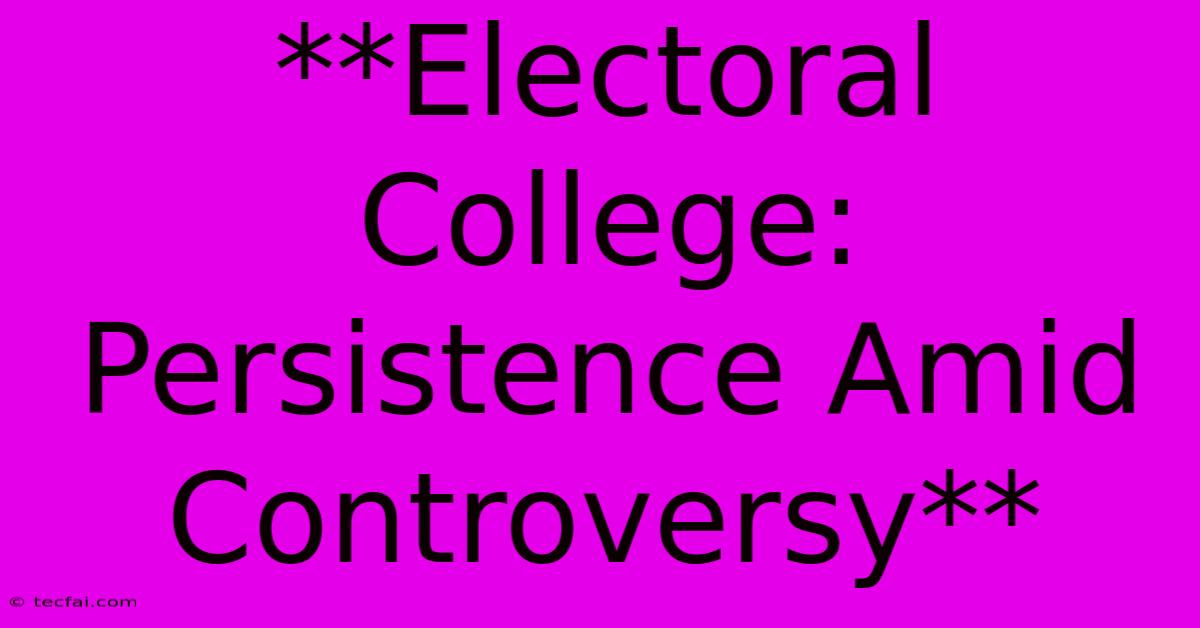**Electoral College: Persistence Amid Controversy**

Discover more detailed and exciting information on our website. Click the link below to start your adventure: Visit Best Website tecfai.com. Don't miss out!
Table of Contents
Electoral College: Persistence Amid Controversy
The Electoral College, a unique feature of the United States presidential election system, has long been a subject of debate and controversy. While it remains a cornerstone of American democracy, its continued existence is regularly challenged, sparking heated discussions about its fairness, effectiveness, and relevance in a modern political landscape.
Understanding the Electoral College
The Electoral College is a body of electors established by the United States Constitution, constituted every four years for the sole purpose of electing the president and vice president of the United States. Each state is allotted a number of electors equal to the total number of its senators (two) and representatives in the House of Representatives. Additionally, the District of Columbia receives three electors, as per the 23rd Amendment.
The candidate who wins a majority of electoral votes (currently 270 out of 538) is elected president. However, the system also allows for the possibility of a president being elected without winning the popular vote. This has happened five times in American history, most recently in 2016.
Arguments for the Electoral College
Proponents of the Electoral College argue that it serves several important purposes:
- Preserves the balance of power between large and small states: The system ensures that smaller states, with fewer representatives in the House, still have a significant voice in the presidential election. This is seen as vital for maintaining a federal system where states retain considerable autonomy.
- Encourages candidates to campaign nationwide: By requiring candidates to secure electoral votes from different regions, the Electoral College compels them to reach out to a diverse range of voters, fostering a broader national campaign.
- Protects against a candidate winning the presidency with a narrow popular vote: The Electoral College system requires a candidate to win a clear majority, preventing situations where a president is elected with only a small percentage of the popular vote.
Arguments Against the Electoral College
Opponents of the Electoral College argue that it is outdated, undemocratic, and often leads to results that do not reflect the will of the people:
- Undermines the principle of one person, one vote: The Electoral College system allows for the possibility of a candidate winning the presidency despite losing the popular vote, which can create a sense of disenfranchisement among voters who did not support the winning candidate.
- Creates an imbalance in the value of votes: The system disproportionately benefits voters in less populated states, as their votes hold more weight than those in more populated states.
- Discourages voter turnout: Knowing their vote might not have the same weight as another voter in a less populated state, some people, particularly in large cities, may feel less motivated to participate in the election.
The Ongoing Debate and Future of the Electoral College
The debate over the Electoral College is likely to continue for the foreseeable future. The potential for a candidate to win the presidency despite losing the popular vote, coupled with the perceived unfairness of the system, continues to spark calls for reform or even outright abolition. However, any significant changes to the Electoral College would require a constitutional amendment, which is a highly complex and challenging process.
The Electoral College, despite its controversy, remains a significant component of American democracy. Whether it will continue to be a defining feature of presidential elections in the future remains to be seen, but the debate surrounding its existence is a testament to the ongoing dialogue about how best to ensure a truly representative and democratic system.

Thank you for visiting our website wich cover about **Electoral College: Persistence Amid Controversy**. We hope the information provided has been useful to you. Feel free to contact us if you have any questions or need further assistance. See you next time and dont miss to bookmark.
Featured Posts
-
Beyonce Channels Pamela Anderson In Red Baywatch Suit
Nov 05, 2024
-
Trump Supports Rfk Jr S Fluoride Removal Plan
Nov 05, 2024
-
Vauban Buckaroo Lead Cup Picks
Nov 05, 2024
-
Quincy Jones Iconic Producer Dead At 91
Nov 05, 2024
-
Saints Fire Allen After 7 Game Losing Streak
Nov 05, 2024
